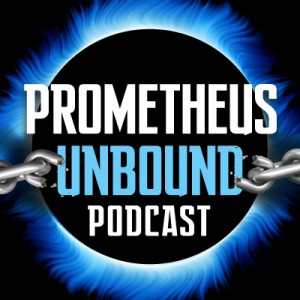
In episode two of the Prometheus Unbound Podcast, Matthew and I (Geoffrey) discuss libertarian speculative fiction and introduce the Book of the Month, Today’s Tomorrows Writing Prompt, and Fiction Forecasts segments of the show.
We break the ice with some brief chit-chat about what we’ve been reading before seguing into our discussion of libertarian spec fic. The Book of the Month is Coyote by Allen Steele. In Today’s Tomorrows Writing Prompt, we turn a speculative eye on the very real possibility of an intellectual-property dystopia. And in Fiction Forecasts, we talk about upcoming (at the time of recording) television shows, movies, and books.
What We’ve Been Reading
Libertarian Speculative Fiction
We covered a lot of ground in our discussion of libertarian spec fic, but we really only scratched the surface of this broad, deep, and no doubt controversial topic. I’m sure we’ll be revisiting many of the stories and issues we covered, and many more besides, in future episodes. So subscribe and stay tuned!
Here’s a brief rundown of some of the things we covered: what qualifies a work of fiction as libertarian; libertarian themes in science fiction and fantasy; why they seem to be more common in science fiction and why libertarians seem to favor this genre; our favorite works of libertarian spec fic; the Prometheus Awards; and probably more that I’m forgetting as I write this.
[continue reading…]
Help Promote Prometheus Unbound by Sharing this Post
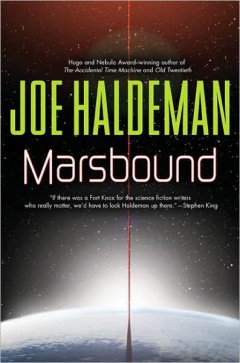

Joe Haldeman began a series with the book Marsbound. Like his other books that I have read, it starts quickly, wastes little time with descriptions, treats people mechanistically, with little emotion or soul, but tells an interesting tale. Marsbound is less entertaining than The Forever War and Forever Peace, but it is still a decent read.
The story begins on Earth, where a university student named Carmen Dula and her family are waiting for a taxi. They are on their way to Earth’s space elevator, which over the course of several days will take them up to a spaceship, which in turn will take them to Mars where they will be staying for the next five years. That is, unless something unexpected pops up.
Carmen gets on the wrong side of the bureaucratic leader of the Mars colony before she even arrives. One night, stinging from a punishment meted out to her and feeling rebellious, she goes for an unapproved walk in her Mars suit. While out, she injures herself and cannot get back. On the verge of death, she is visited by a strange creature who saves her…
[continue reading…]
Help Promote Prometheus Unbound by Sharing this Post
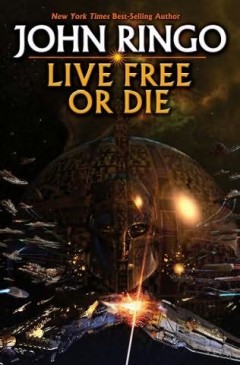

In 2010, John Ringo published the first book of the Troy Rising trilogy. Titled Live Free or Die, it is a story on a grand scale, a great symphony of a book but by an author who probably should stick to bagatelles. Though it started well and had my interest, it was a chore to get through most of it. There was enough creativity and verve for a short story, but by the end these had faded and I was glad to be finished.
It is the kind of story I imagine Ted Nugent would enjoy reading. Filled with gun-toting, rugged individuals who thrive on infuriating the Thought Police and composing odes to capitalism, the book might almost seem libertarian until one realizes just how besotted with militarism and American exceptionalism the author is. I have no problem with a man a bit rough around the edges, a touch short on couth and decorum, but Ringo at times goes beyond that into deliberate callousness, especially as regards sex and race.
There are many sensitive liberals who both need and deserve a little rattling from time to time, if only for our amusement, but there are just as many conservatives who could use a dose of circumspection, introspection, and nuance. I am tempted to suggest we lock Ringo in a room with his diametric opposites, to see if there might be a mutually beneficial rubbing off, but I am afraid someone would end up dying.
Live Free or Die begins with an alien race that establishes a portal in our solar system. They have no goals except to neutrally manage the portal, but the next race that appears is bent on imperial control of Earth. They begin by destroying some major cities and then demanding tribute. Though this species, the Horvath, is technologically backwards in comparison to other civilizations in the galaxy, they are yet far ahead of humans.
[continue reading…]
Help Promote Prometheus Unbound by Sharing this Post
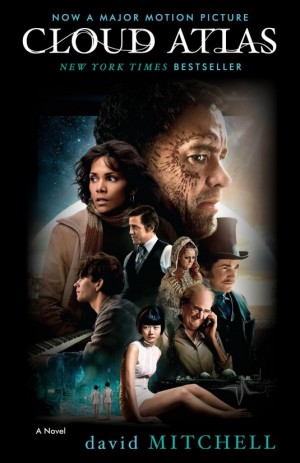
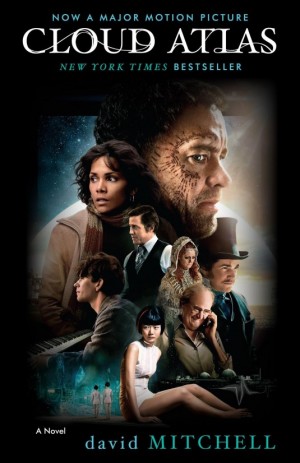
Cloud Atlas, a movie based on the novel of the same name, is a bundle of stories with interconnecting threads meant to form a greater pattern, a message to the viewer. We are all in this together, we conclude by the movie’s end. Sometimes we are nice to each other, and sometimes we are not, but either way our actions resonate into the future, even as they were partly shaped by actions from the past that resonated into the present. The filmmakers are successful in creating this pattern, but as a piece of entertainment and a storytelling vehicle, the movie itself achieves only limited success.
Each story of the larger tale is engaging by itself. That is, the scenario created is interesting enough and worthy of its own movie. The scenes are shot well, and thoughtfully, and the worlds, ranging from far in the past to far in the future, are imaginative conceptions where many other stories might take place. Given this format, it is difficult to summarize the film, which is just as well because watching it becomes more of an exercise in identifying themes and spotting parallels than in following a plot.
The cutting between stories is done in such a way as to prevent momentum from accruing. While I have read many good books that switched between multiple characters to good effect, these books had the characters as part of the same story, so that an advance in the plot of one character’s story had immediate and important ramifications for the other characters, wherever they were in their story arcs. Each chapter usually had a beginning, middle, and end, as if it were its own short story, and finished with some sort of hook to make you regret leaving that character.
In Cloud Atlas, a character in one tale might compose music that another character hears decades later, but the connection is only important for the theme; it has no bearing on the obstacles to be overcome in the endeavor to reach a goal. With only a handful of exceptions, the characters in later times are not even aware of the ones who anteceded them. Imagine taking scenes from Amistad, Blade Runner, Star Wars, Miller’s Crossing, and Three Days of the Condor and mixing them together into one film. As far as the plot goes, this is almost exactly how isolated each story is from the others, how little they have to do with one another.
[continue reading…]
Help Promote Prometheus Unbound by Sharing this Post

Matthew and I recorded a brief promotional spot for the Prometheus Unbound Podcast. It includes part of the intro and outro that you will soon become familiar with as well as information about what listeners can expect from the podcast.
Join us as we
- interview your favorite authors, editors, and libertarian scholars;
- and discuss science fiction and fantasy in books, movies, and television.
You’ll enjoy segments like
- Book of the Month, in which we recommend a great book that ties in with that episode’s theme;
- Today’s Tomorrows Writing Prompt, where we take a current trend in society, explain its causes, and extrapolate how it will play out 10, 50, 100 years into the future;
- and Fiction Forecasts, in which we talk about upcoming books, movies, and tv shows, and predict our reactions.
As well as
- audio reviews;
- tips on writing, marketing. publishing, tools of the trade;
- and listener feedback that we read or play and respond to on the show.
[continue reading…]
Help Promote Prometheus Unbound by Sharing this Post

In this January 12, 2010 episode of the Libertarian Tradition podcast series, part of the Mises Institute’s online media library, Jeff Riggenbach discusses the important role played by novelist and philosopher Ayn Rand in the early libertarian movement.
Editor’s Note: A transcript is unavailable. This early episode was never turned into a Mises Daily article most of the others.
Here is a brief summary, however:
In light of then recently released books on Ayn Rand — Jennifer Burns’s Goddess of the Market: Ayn Rand and the American Right and Anne C. Heller’s Ayn Rand and the World She Made — Riggenbach discusses Rand’s role in the early libertarian movement. Along the way he highlights Heller’s defense of the quality of Rand’s writing against mainstream literary critics. He goes on to argue that Heller’s book is the better of the two and explains what mars Burns’s book. He plays a couple of clips of Rand herself explaining why she and her philosophy of Objectivism are not conservative, and challenges the coherence of Burns’s conception of the American Right.
If you’re unfamiliar with Ayn Rand and her importance in the libertarian tradition, this episode offers a good primer on the subject as well as on what differentiates libertarianism and conservatism.
Help Promote Prometheus Unbound by Sharing this Post

In this January 6, 2010 episode of the Libertarian Tradition podcast series, part of the Mises Institute’s online media library, Jeff Riggenbach takes us on a biographical tour of the life of libertarian novelist and philosopher Ayn Rand.
Editor’s Note: A transcript is unavailable. This early episode was never turned into a Mises Daily article like most of the others.
Here is a brief summary, however:
In light of then recently released books on Ayn Rand — Jennifer Burns’s Goddess of the Market: Ayn Rand and the American Right and Anne C. Heller’s Ayn Rand and the World She Made — Riggenbach goes on to chronicle Rand’s early life in Soviet Russia, how she got out and immigrated to the United States, her work in Hollywood and her Broadway play, Night of January 16th, and her marriage to Frank O’Connor.
Riggenbach then covers the publication of her four major works of fiction: We the Living, Anthem (a novella), The Fountainhead (adapted to film with a screenplay by Rand), and her magnum opus, Atlas Shrugged. He also discusses Rand’s relationship with Nathaniel Branden, the formation of her inner circle, the publication of Rand’s nonfiction works, and the growth of the Objectivist community.
All that in 20 minutes! Phew!
If you’re unfamiliar with Ayn Rand and her work and life, this episode offers a good overview.
Help Promote Prometheus Unbound by Sharing this Post















